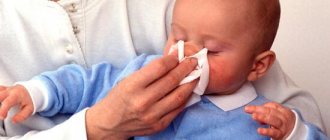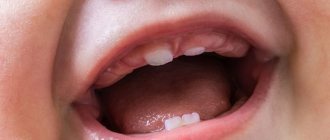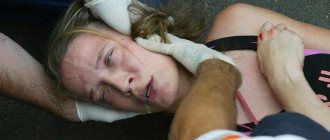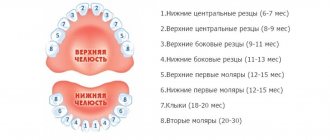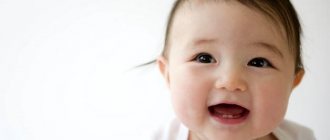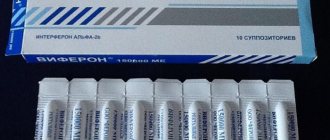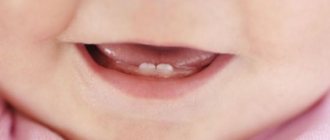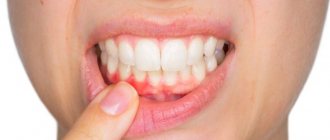All children experience the eruption of their first baby teeth differently. Some kids behave calmly and only act up a little more often than usual. For others, this process does not go so smoothly and is accompanied by constipation, refusal to eat, increased irritability and a rise in temperature.
A particular danger for infants is prolonged retention of stool. It leads to dysfunction of the gastrointestinal tract and intoxication of the body, often causing severe spasms and pain. Find out why constipation occurs during teething in children and what methods can be used to eliminate it.
Timing of teeth appearance. When do teeth start cutting?
Sometimes parents expect that teeth will start cutting in on time, and if this does not happen, they begin to get seriously nervous, because late appearance of teeth can be one of the symptoms of rickets. And the therapist at the appointment can tell you the timing of their appearance for the same reason.
Don’t panic if your child is already 8-9 months old and still has no teeth. In fact, this is only one of many symptoms of such a serious disease that cannot be considered on its own. The process of teething is individual for each child.
The first tooth can appear between 3 and 10 months. And both extreme options are the norm. Only the later appearance of the first tooth can cause some concern in the absence of other external abnormalities.
The average time for teeth to appear can be represented as follows:
- The 2 lower incisors appear first at 6-8 months of age;
- all 4 upper incisors grow sequentially in the period from 8 to 12 months;
- at approximately 10-13 months, the lower lateral incisors appear;
- the first molars, first the upper and then the lower, are cut at 12-15 months;
- fangs appear at 18-20 months, also first the upper ones, then the lower ones.
All 20 teeth finally appear by 2.5-3 years. Moreover, if the baby’s teeth began to cut early, then the process may be completed earlier - already by 2 years. If, on the contrary, the first tooth appeared only at 9-10 months, the last ones can appear only at 3-5 years.
After a year, the baby may cut several teeth at the same time, and then this process can be really very painful.
Homeopathic medicines for children to improve immunity
Today, the category of frequently ill children is growing. Such children definitely need to strengthen their immunity. The German remedy Galium-Heel copes well with this task in preschool children. It is used to activate the body's immune cells and prevent viral and bacterial diseases.
Engystol is a drug that has proven itself to be an effective means of strengthening the immune system during viral infections. It accelerates metabolic processes in the children's body and is used during periods of epidemics.
Echinacea Compositum is used to relieve inflammatory processes in children and accelerate the elimination of toxins.
There are homeopathic remedies that simultaneously treat colds and boost immunity. These are Influcid, Antigrippin, Aflubin.
Influcid is produced by the German Homeopathic Union in the form of tablets and solution. It is recommended for children of primary preschool age. If we talk about domestic complex homeopathic preparations, then parents can recommend Edas, Silicea compositum and Lachesis compositum, Oscillococcinum, Zinfil, Coryzalia to increase the immunity of their children.
Organic preparations, which are extracts from the body of animals, are also used for this purpose. These are Mutsosa tsop, Larynkh tsop, Tonsilla tsop.
Teething symptoms
Teething, although a natural process, can cause significant inconvenience. Moreover, the problem, as a rule, does not arise with the first tooth. The lower incisors come out relatively painlessly, but the upper and molars can cause a lot of trouble.
The upper jaw is denser and it is more difficult for teeth to “pierce” it. Molars cause discomfort due to their size.
My son’s first teeth appeared spontaneously, and even the upper incisors erupted quite easily, but then the nightmare began. Almost simultaneously, four teeth began to appear, then two more were added to them, and we learned everything that we had only read about in books before. The child was capricious, refused to eat anything, and could not sleep at night. Only the gum gel saved me, and even then not for long, since it was used strictly according to the instructions in order to avoid complications.
What symptoms can you use to understand that your baby is suffering from teething problems?
- the child becomes capricious;
- in the mouth you can notice redness and, as it were, loosening of the gums at the site of tooth eruption;
- salivation increases;
- the baby may refuse solid food, his taste preferences may change, he may not eat at all;
- a slight increase in temperature may be observed - up to 37.7-38 ° C.
Along with redness at the site of tooth growth, in rare cases, a small hematoma or even an abscess may be observed. They pass with his appearance.
If the inflammation is significant, accompanied by a significant increase in temperature, and the baby’s condition worsens, it is better to take him to the dentist, who will treat the site where the tooth appears to prevent the development of infection.
Does a mother's constipation affect her breastfeeding baby?
Errors in the nutrition of a nursing woman can affect the baby’s digestion. To relieve a baby from constipation, his mother will have to reconsider her menu. What dietary disorders can cause constipation?
- lack of water: if the mother drinks little, then where does the body get liquid to produce milk?
- excess foods with a fixing effect: rice, pasta, pastries, white bread, strong tea and coffee;
- lots of milk and dairy products. Constipation may result from intolerance or allergy to cow's milk protein, the most common type of allergy in the first year of life.
- There is little fiber in a woman's diet.
Myths about teething
Although the appearance of baby teeth can be painful, cause slight inflammation in the mouth and even a slight increase in temperature, it is not a disease.
However, since the antibodies that reach the baby in the mother’s belly are destroyed over time, by six months the baby’s immunity weakens, and the process of teething itself reduces the body’s defenses. This is why other painful conditions may arise during this period, which are very often attributed to the appearance of teeth.
In order not to harm the child, and not to miss the symptoms of another disease during this period, we will dwell in more detail on the main myths about teeth.
Heat
As already mentioned, teething can cause minor inflammation and, consequently, an increase in temperature. But if the temperature is above 38.5° C, especially if it rises to 39° C, it is most likely a cold or infection. And this is a reason to see a doctor.
Loose stools
This myth is especially tenacious among the people. It is believed that teething can have a negative impact on bowel function. Your baby's bowel movements may indeed change if he refuses his usual food because of gum pain, but these are usually minor changes. In very rare cases, loose stools may occur due to increased salivation for no more than 72 hours, and at intervals no more than 3-5 times a day.
If your baby suffers from diarrhea, especially accompanied by vomiting, he probably has an infection. This is not surprising, given how many objects (and not always clean ones) are put into the mouth to relieve itching in the gums.
Runny nose
Indeed, sometimes teething is accompanied by a slight runny nose. But nasal discharge should be thin and clear. If their color is yellowish, greenish, they are thick, and the baby’s nose “can’t breathe” - it’s time to see a doctor.
Cough
Saliva can also get into the baby's throat, causing coughing and wheezing during sleep. But, as a rule, such phenomena are episodic, and the cough cannot be “chest.” If your baby does experience increased salivation, which can make breathing difficult and cause discomfort during sleep, it is advisable to slightly raise the head of the crib. If the cough does not go away in this case, and is observed constantly while you are awake, you should not attribute the problem to your teeth.
Vomit
Increased salivation can provoke a response from the child's stomach, but this happens very rarely, and such a phenomenon is a one-time occurrence. If a child vomits more than once, the teeth have nothing to do with it.
Skin rashes
Teeth cannot in any way affect the condition of the skin. The only thing that can happen is a slight irritation in the child’s mouth from the teether or irritation from saliva. Any other manifestations are a reason to contact a dermatologist.
Otitis
Surprisingly, some believe that teething can cause a disease such as otitis media. Your baby may indeed pull and rub his ears when he is teething, but this is not associated with inflammation. It’s just that the teeth and ears have one nerve center. In this case, there is no reason to give the child medicine or drops.
Other symptoms of inflammation, such as high fever, discharge from the ears, and pain when pressing above the earlobe, may cause concern. Such signs have nothing to do with the appearance of teeth.
Homeopathic medicines for the treatment of the thyroid gland in children
Unfortunately, today pediatricians and endocrinologists are increasingly diagnosing decreased thyroid function in children, that is, hypothyroidism. The disease is manifested by weakness of all processes occurring in the body. You can suspect something wrong with the thyroid gland in a child based on the following symptoms: weight gain, drowsiness, lethargy, chilliness, shortness of breath, low blood pressure, slow bowel function (regular constipation), impaired kidney function (swelling).
Most representatives of official medicine prescribe hormones for children with hypothyroidism. The consequences of such treatment usually include weight gain and obesity.
The choice of homeopathic medicines for thyroid diseases in children depends on the symptoms. For example, Calcarea carbonica is prescribed to overweight children with a large belly. As a rule, their teeth erupt late, their fontanelles do not heal for a long time, they experience night sweats on the head and a tendency to allergies. Often these children have enlarged lymph nodes.
Calcarea carbonica is also suitable for treating teenage girls with thyroid disease and heavy menstruation.
Calcium carbonicum is a drug prescribed in the clinic of hypothyroidism in children with delayed mental and sexual development. Such children experience delayed speech development and decreased intelligence.
Argentum nitricum is a remedy recommended for the treatment of toxic goiter. This disease is characterized by impulsiveness and haste of the child, stabbing pain in the throat, tremors of the limbs, and a tendency to lose weight. The drug Nux vomica has a similar effect.
Brushing our first teeth
Some parents believe that oral hygiene should be started when the baby already has several teeth; until then, there is simply nothing to brush. In fact, there are plaques on the child’s gums. These are small films that can accumulate food debris and be a source of infection. For this reason, dentists recommend starting to brush your teeth before they even appear.
It is not recommended to use a full-fledged toothbrush until the age of two. Oral hygiene can be carried out with a special children's brush, which is placed on your finger, or simply with a small piece of gauze soaked in boiled water.
The child’s mouth needs to be cleaned 1-2 times a day, and after the first teeth appear, special attention should be given to them to prevent the development of caries in the future.
Homeopathic medicines for the treatment of adenoids in children
The basis of homeopathy for adenoids in children is the anti-inflammatory effect and improvement of metabolic processes. Strict adherence to the recommendations of a homeopathic doctor and long-term treatment with such remedies makes it possible to avoid surgical intervention for adenoids in children. Doctors usually recommend thuja oil as a monotherapy.
Barberry Comp Job Baby has a complex effect. It contains thuja, iodine, berberis, and eupatorium. Complex aerosol Euphorbium compositum Nazentropen S is used for irrigating the throat cavity and contains several plant components.
Treatment of adenoids in children with the above drugs makes it possible to achieve resorption of the formations themselves. After just 6 months of taking such drugs, the inflammatory processes in the nasopharynx and throat that accompany adenoids cease. However, it is recommended to treat this childhood illness with homeopathy for at least a year with strict adherence to the doctor’s instructions and regular monitoring.
How to make teething easier
As already mentioned, a special cooling gel and, of course, the main assistant for parents - a teether, can help the baby with teething. There are currently many of the latter, and by the time teeth appear, it is highly advisable to stock up on not one, but several such toys.
The child will most likely choose the teether that he likes.
- Silicone massagers are softer. If you cool them in the refrigerator before using, you can achieve a cooling effect.
- Rubber massagers are stiffer, stimulate the gums better and, as a rule, have less relief.
A child with different teeth may prefer different types of teethers. For example, my son actively used silicone with his upper incisors, and regular rubber with his fangs.
Traditional methods to facilitate the teething process
In addition to special devices that are sold in pharmacies, you can help your baby with “folk” remedies:
- Give a crust of bread to chew if your baby is already eating solid food. The son was gnawing on his favorite treat - children's cookies. The pleasant taste and slight stimulation of the gums helped relieve his condition for a while.
- If the process is very painful for the baby, and the teether seems unattractive to him, you can let him suck your finger and give him a light massage.
- You can wipe your gums with a chamomile solution - it will relieve inflammation and promote the healing of small wounds. I brewed chamomile and left it in the refrigerator for a few minutes, then wiped my son’s gums with a gauze swab dipped in the cool infusion.
- Decoctions of burdock, sage and plantain roots relieve inflammation, which can also be used to lubricate the gums during a massage.
- Honey will help relieve irritation if the baby is not allergic to bee products. You can wipe your gums, or let them suck on a piece of gauze wrapped around your finger and previously soaked in diluted honey.
- You can brew soothing tea with lemon balm, mint, and valerian. The main thing is that the baby is not allergic to such herbs, and their concentration is small. Mothers can also drink this tea if the baby is breastfed and does not refuse the breast. This measure will make the baby calmer and make it easier to fall asleep.
Don't forget about the beneficial effects of cold. If your baby already eats fruits and vegetables, you can chill the pieces in the refrigerator and give them to your baby.
And remember that the main thing for a child during the teething period is the affection and care of the mother. Feeling your support and love, the baby will be less capricious and will go through this stage of growing up more easily.
Homeopathic medicines for children from allergies
Allergic reactions today tend to become more frequent in childhood. And while adults are more patient, itching and skin irritation as allergy symptoms are difficult for children to tolerate. They scratch the body until it bleeds and thereby contribute to the spread of infections. The drug Rhus tochicodendron is used to reduce itching that occurs with eczema, urticaria, and atopic dermatitis. Rus 3 has a similar purpose.
Belladonna 3 is prescribed by homeopaths at the first manifestations of allergies, skin redness and swelling.
Alumina 6 is a homeopathic remedy that helps with exacerbation of itching in a warm room.
Coffea 6 is used at night to soothe severe itching of a child's skin.
Ointments for external use are often prepared from the above-mentioned drugs. They are applied to children directly on the itching areas. Do this 2-3 days in a row.
Treating allergies with homeopathic remedies helps parents and children cope more peacefully at night, when itching and tingling of the skin traditionally increases.
It is worth noting that sometimes the use of such remedies for allergies in children leads to an increase in their mobility and strengthening of the immune system, provided that the advice of a homeopathic doctor is strictly followed. As a rule, having achieved stable remission, doctors also prescribe medications to increase immunity and cleanse the child’s body.
